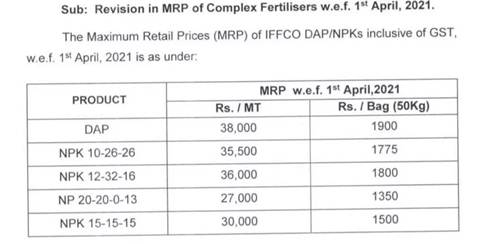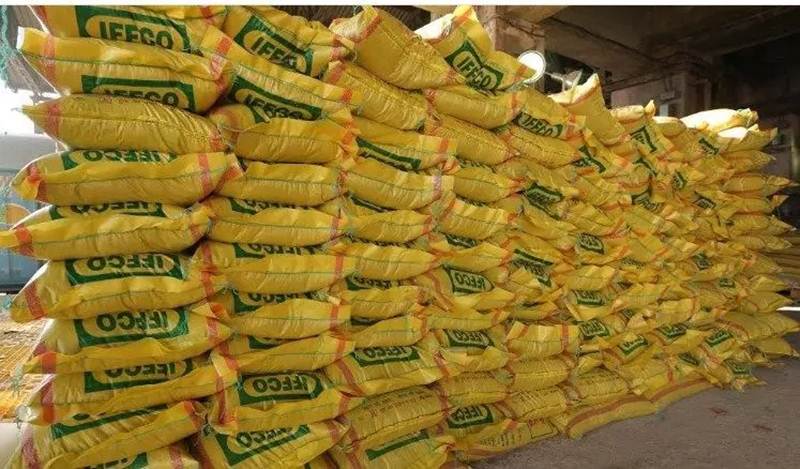In the wake of the Indian Farmers Fertiliser Cooperative Ltd’s (IFFCO) announcement of a sharp rise in fertiliser prices, and the criticism of this move by an array of experts, politicians and farmers’ organisations, the cooperative has come out in the defence of its decision.
On April 8, IFFCO announced that a 50-kg bag of di-ammonium phosphate (DAP), the most extensively used fertiliser in India after urea, would now cost farmers Rs 1,900. This is more than 58 per cent higher than the prevailing rate of Rs 1,200 per bag.
Also Read: COVID19- Is Maharashtra heading for a lockdown?
विनिर्माण संगठन होने के नाते हमें अपने संयंत्रों द्वारा प्रसंस्कृत नई सामग्री को प्रेषित करने के लिए बैगों पर मूल्य अंकित करना पड़ता है।पत्र में उल्लिखित मूल्य केवल बैगों पर दिखाने के लिए उद्धृत अस्थायी मूल्य है,जो अनिवार्य है।@PMOIndia @DVSadanandGowda @mansukhmandviya
— Dr. U S Awasthi (@drusawasthi) April 8, 2021
It also increased the prices of other widely used complex fertilisers with different NPKS (nitrogen, phosphorus, potash and sulphur) proportions. These entail 10:26:26 (from Rs 1,175 to Rs 1,775 per bag), 12:32:16 (from Rs 1,185 to 1,800 per bag) and 20:20:0:13 (from Rs 925 to 1,350 per bag).

However, within hours after the decision’s announcement and the resulting criticism, UK Awasthi, the managing director and chief executive officer (CEO) of the cooperative took to Twitter to put out a series of tweets, explaining the price hike and its stated effect on the farmers.
Also Read: The boatmakers of Balagarh and the changing tides of time
“We at IFFCO, take strong objection for tweets, news linking any political party or Govt for an increase in price of complex fertilisers. They are decontrolled. No linkage to any political party or government,” Awasti stated.
First an unprecedented hike in diesel price, then @FCI_India's new procurement norms, now #IFFCO announces hike in fertiliser price by nearly 40%. GoI is bent on punishing farmers for the #KisanAndolan & state govt adding to woes with total failure to safeguard state’s interests.
— Harsimrat Kaur Badal (@HarsimratBadal_) April 8, 2021
The IFFCO chief blamed the high prices of raw materials in the international markets for the cooperative’s need to increase the prices. He also stated that the price hike is tentative and there is enough stock to be supplied to the farmers at old rates.
“IFFCO will continue to sell the old stock of 11.26 lakh tonnes of complex fertiliser at old rates only, where DAP is Rs 1,200/ per bag. The material with new rates is not for sale to farmers,” IFFCO spokesperson said in a statement.
The new stock has been sent from plants to fields for storage purposes. “The selling price of the same might come down while the old stock is finished,” he said.
The spokesperson added that “aggressive negotiations with international raw material suppliers for price reduction are yet inconclusive. We are trying our best to get the prices reduced for the benefit of farmer.”
Talking to Gaon Connection, IFFCO’s state marketing manager for Uttar Pradesh, Abhimanyu Ray that the new stock was arriving in the storage facilities since April 1 but its sale hasn’t begun.
“The rates for DAP hadn’t been raised for a long time. New rates have been announced and the stocks have arrived but its sale hasn’t begun yet. It is meant for storage purposes only,” he said.
Predictably, the farmers are worried about IFFCO’s recent announcement.
“On an average, half a hectare of wheat crop needs a 50 kg bag of DAP fertiliser and the same acreage of the sugarcane crop requires twice as much DAP. My requirement is 30 such bags of DAP in a year. Earlier, I used to pay Rs 36,000 but with the new prices, I’ll have to shell out Rs 57,000,” Ammar Zaidi, a farmer from Uttar Pradesh’s Hardoi district told Gaon Connection.
“Diesel prices are soaring, with the new increase in fertiliser prices, it is hard to imagine what income will I secure in farming now,” a disappointed Zaidi said.
Govt subsidy only for Urea, other fertlisers’ rate market driven
In India, the production and rates of urea fertiliser is subsidised by the central government. But prices for other fertilisers like DAP are all influenced by the market conditions. The raw materials required to manufacture NPK and DAP fertilisers are imported from international suppliers and their costs are dependent on the global market.



















